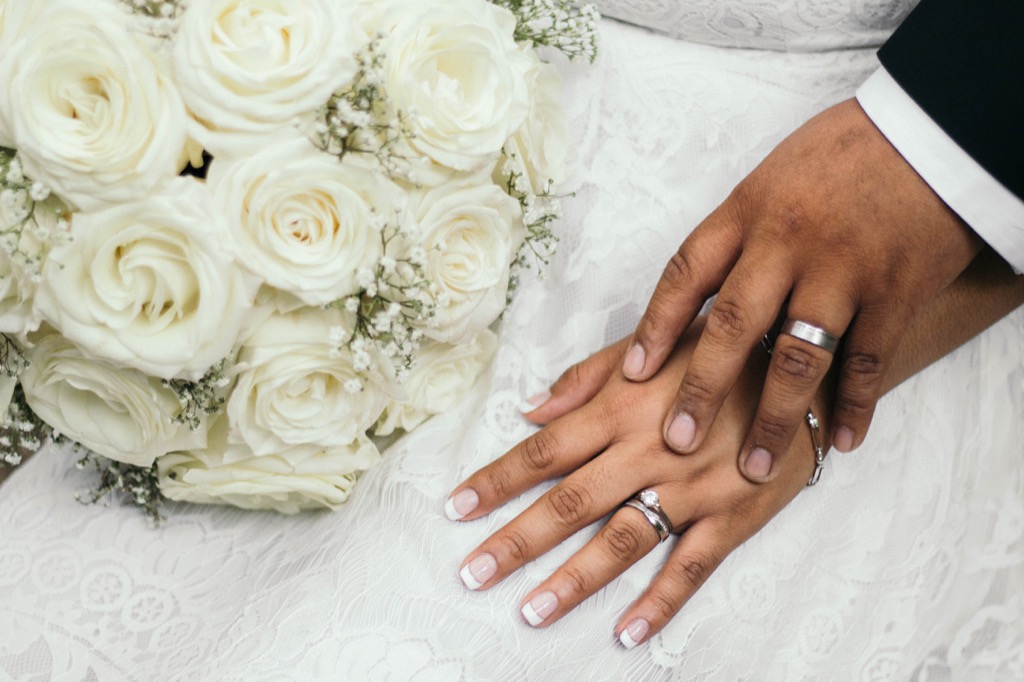In his 2015 research published in the journal Psychological Assessment, Keith Sanford, PhD, a psychology professor at Baylor University, found that partners who admitted that they withdrew often during arguments reported being unhappier and more apathetic about the relationship overall. “Withdrawal is the most problematic for relationships,” Sanford said in a statement. “It’s a defense tactic that people use when they feel they are being attacked, and there’s a direct association between withdrawal and lower satisfaction overall with the relationship.” And for more relationship warning signs, learn the 17 Subtle Signs of Divorce Most People Don’t See Coming. When Virgil wrote that “love conquers all,” he had clearly never been in a serious relationship. Yes, love can overcome many things, but if there’s one thing that it can’t overcome, it’s not being on the same page. At the end of the day, you and your partner need to be clear about fundamental decisions like where to live, when and if to have kids, and how to save and spend money—otherwise, the relationship will fall apart. According to Lesli Doares, a certified relationship coach in Cary, North Carolina, “67 percent of disagreements in a relationship never get resolved and they don’t need to, but the other 33 percent, if not resolved, can lead to the end of the relationship.” Doares notes that these so-called “dealbreakers” are often “desires of one partner for the relationship to get more serious, personal beliefs and values, the kind of lifestyle each person wants to live, and wanting to have children.” Your partner is likely doing the best they can—but like any human, they’re going to mess up and make mistakes sometimes. And while a supportive spouse handles these slip-ups like an adult, an unsupportive one will treat their partner like they should be perfect 100 percent of the time, leading to frustration on both ends. “When your partner doesn’t measure up to something they didn’t even sign up for, there is a tendency to try to change them, with no understanding that your own behavior plays a huge role,” says Doares. “By focusing on your partner, it allows for justification as to why they are the problem.” Many people will avoid conflict and pretend that issues in their relationship don’t exist simply because they live in fear of being alone. However, this strategy backfires, as all conflicts will rear their ugly heads eventually—and by then, it’s usually too late to solve them. “Being afraid of being alone, and thus willing to accept any relationship no matter how unhealthy, is another common pattern that keeps relationships from working,” says Doares. “Appropriate boundaries need to be identified and enforced.” At the beginning of a relationship, couples tend to be honest and open about their feelings and emotions. But as things progress, many people doom their relationships by assuming that their significant other can—and should be able to—read their body language and just know what’s on their mind. “Where a conversation once existed, now there is silence, an eye roll, or edgy energy emitting that becomes divisive if not ultimately crushing,” explain relationship experts Greg Behrendt and Amiira Ruotola, authors of It’s Called a Breakup Because It’s Broken. “Over time we get too comfortable in our partnership, too lazy, or sometimes even become apprehensive and we stop communicating thoughtfully with each other.” And if your marriage feels off, try these 65 Ways to Be a Better Spouse After 40, According to Experts. The worse things are in your own relationship, the better everyone else’s is going to look. But by comparing yourself, you are only going to feel worse. You’re ultimately sabotaging whatever of your relationship there is left to salvage. “Comparison is the thief of joy,” note Behrendt and Ruotola. “Focus on your own relationship rather than coveting someone else’s. The grass is greener where you water it and no relationship is as flawless as it looks on Instagram.” Compromising isn’t just about letting your spouse choose which restaurant you go to every once in a while. In a healthy, committed relationship, to compromise is to make “the conscious choice to accept each other for exactly who you are,” writes Laura Schlessinger, a relationship expert and the host of the Sirius XM radio show The Dr. Laura Program. “If you want your relationship to last, you need to give up your need to be right and in control all of the time.” Have you ever found yourself crying in a fit of rage while your partner hasn’t so much as shed a tear? This may be a sign that your relationship is on the rocks. A couple’s meta-emotions—that is, how they feel about emotion—need to be on the same page. As marriage researcher John Gottman, PhD, discovered, meta-emotion mismatches were 80 percent accurate in predicting divorce. Basically, it’s not about the conflict itself—it’s about handling it in a complementary way to how your partner handles it. Having contempt for your partner is one of the four behaviors that Gottman says is a telltale indicator of an impending divorce. In his research, he polled couples on how often they behaved with contempt, criticism, defensiveness, and stonewalling. Then, he measured perceived relationship satisfaction and found that the behaviors were over 90 percent successful in predicting divorce. According to Gottman, seeing your partner as inferior in particular is the “kiss of death” for any relationship. And this makes sense, given that another 2010 study published in the Journal of Marriage and Family found that couples who showed contempt for each other within their first year of marriage were more likely to divorce before their 16th wedding anniversary. Feel like things are past the point of no return? These are the 15 Signs You Should Go to Couples Therapy. In a 2014 study published in the journal Current Directions in Psychological Science, researchers determined that the people you love most are also the people you’re most likely to take your anger out on, given that you interact with them more than anyone. But unfortunately, what they also found is that “aggression is harmful to individuals and to relationships,” meaning that the more you hurt the people you love, the more you risk pushing them away. It’s hard to focus on the present when you’re busy living in the past. And this is especially true in a romantic relationship, as your complete and undivided emotional and physical presence are required in order to make things work. If you want your current relationship to last, leave the past in the past and let go of the things that are holding you back. Trust is not an easy thing to build with someone (especially if you’ve been betrayed in the past), but you should have faith in the person with whom you intend to spend the rest of your life. Should you build a partnership on a foundation of mistrust, you risk lacking both physical and emotional intimacy. Plus, you can almost guarantee that eventually your partner will get fed up and walk away. If you love a good nightcap before heading to bed, then you should be sure that your life partner enjoys one as well. One 2013 study from the University of Buffalo found that around 50 percent of married couples with differing alcohol habits got divorced before they hit the 10-year mark. On the other hand, partners who had similar drinking habits—whether they indulged, abstained, or consumed alcohol moderately—only had a divorce rate of about 30 percent. Secrets are no fun, especially in a long-term relationship. And what’s even worse is lying about them, like when “your partner keeps secrets from you and blames you when you call them out on their secrecy,” says Terry Gaspard, MSW, LICSW, a relationship expert and therapist in Massachusetts and Rhode Island. “They will say things like, ‘You just couldn’t handle it if I was open and honest with you, which is why I had to lie,’” Gaspard explains. If you notice your partner lying to your face and then holding you responsible for their loathsome actions, it might be time to sit down with them and address the problem directly before things escalate further. Every couple fights, but healthy ones end them with both parties apologizing and taking partial blame for what has transpired. But in a relationship that’s reaching its breaking point, you might find that either you or your partner refuse to accept any of the blame, with one of you painting themselves entirely as the victim. “We are all taught a language of blame when we feel powerful emotions,” says Carey Davidson, CEO of integrative healthcare company Tournesol Wellness. “It’s so much easier to become a victim than it is to think about our emotions as our body’s way of telling us [that] our core needs for growth aren’t being met.” And for more up-to-date information, sign up for our daily newsletter. A healthy and happy relationship should revolve around how each person is feeling. “In times of conflict … we shift our mindset toward recognizing core needs for ourselves and our partners,” explains Davidson. “[We try] empathizing with our own unmet needs, empathizing with our partner’s unmet needs, and then coming up with a plan for meeting them both.” However, partners in unstable relationships often find themselves fighting with their significant other, with little to no regard for how the other person feels. A couple will never understand each other when there is a lack of reverence in the relationship. And if one partner has a blatant disrespect for the other’s life choices, neither partner will ever feel comfortable talking about their day, let alone their feelings or beliefs. “The biggest reason that I see on why a relationship does not work out is that one partner does not respect the other,” says Alexis Dent, owner of wedding vow company XO Juliet. “That is a formula for disaster, as they will never be on the same page and things will fall apart.” A big and unexpected life event, like the death of a parent or a sudden job layoff, can shake a relationship to its core. And, oftentimes, these life-changing moments will result in other major changes that many relationships struggle to survive. “Sometimes due to a death in the family, development of an illness, or simply a desire to change careers, a person may want to move to a different area, work less, or they pick up bad habits, like drinking, drugs, [or] sex addiction,” says Regina DeMeo, a matrimonial attorney in Bethesda, Maryland. “If your partner doesn’t agree with these changes, then you no longer have a shared vision of where you need to be or where you are heading, which leads to irreconcilable differences.” It’s not necessarily how each partner spends money that causes problems in a marriage, it’s how one partner thinks their significant other is spending that does. When Ashley LeBaron, a graduate student at Brigham Young University (BYU), and her fellow researchers studied couples and their spending habits in 2017, they found that husbands who viewed their wives as big spenders had the greatest financial conflicts, regardless of actual spending habits. “When it comes to the impact of finances on relationships, perceptions may be just as important, if not more important, than reality,” LeBaron said in a statement. Relationships are all about give and take—and if you take more than you give, then the balance will be thrown off and your partner will likely seek comfort in other places and people. In fact, this is such a well-known phenomenon that experts have even given it a name: It’s called the Social Exchange Theory. According to Mark V. Redmond of Iowa State University, the theory outlines how “we are disturbed when there is no equity in an exchange or where others are rewarded more for the same costs we incurred.” When your significant other spends the entire day slaving away on a home-cooked meal, don’t forget to thank them for all that hard work. Otherwise, your partner will feel like all their efforts have gone unnoticed, or that you feel like your time is more valuable than theirs. “Taking a partner for granted undermines all relationships,” explains Poppy Spencer, MS, CPC, a certified counselor and relationship expert in Florida. “Whether people acknowledge it or not, being a value to a significant other is essential. When gratitude is not expressed, emotional, and sometimes physical, health is compromised.” You might think that your gratitude is implied, but it helps your partner to hear that they’re appreciated. Insecure folks use their partners as a crutch in order to feel better about their many perceived shortcomings. And when the relationship is less than satisfactory, they see this as a slight against who they are as a person, which can lead to anger, frustration, and ultimately, the end of the relationship. Unfortunately, it can be difficult to reason with someone who pins their self-worth to the status of their relationship. One of the most important parts of being in a relationship is loving your partner for who they are without trying to change them. People who secretly wish that their partner was just a little bit more fashionable or athletic will find that they love an unrealistic version of their partner and not the actual person with whom they’re coupled. It always helps to remember that love is unconditional—and if yours isn’t, then it might not be love after all. You can pretend to settle an argument with your spouse just to make it go away, but that is only going to make things worse. Why? “Holding resentment is the quickest way to destroy love,” says California-based psychotherapist Tina Tessina, PhD. “Resentment is like the rust that eats away at the bonds of your relationship.” If you don’t resolve the underlying issues that are causing your resentment and anger, then your relationship will inevitably be worn down to the point of no return. After getting married, it takes work to maintain the spark that once existed in your relationship. If you don’t work on keeping it alive, you risk falling into the same old routines. “From the moment you begin to live together, romantic moments are no longer automatic,” says Tessina. “Instead, much of your time together is spent on more mundane things: doing laundry, washing dishes, paying bills, or going to work. As soon as the initial newness of living together wears off, such everyday things cease to feel exciting and romantic, and you may find yourself feeling worried that your partner no longer cares as much or is as excited to be with you.” Every person in a relationship just wants their voice to be heard—but in return, you need to give your partner that same respect and actually listen to what they’re saying. If your partner thinks that you’re ignoring them, they will feel like their opinions and emotions aren’t important to you—and consequently, neither is the relationship. If you got married straight out of high school or college, you might start to reconsider your relationship later on. According to a 2015 study from Nicholas Wolfinger, a professor at the University of Utah, couples who marry younger are at a greater risk of divorce compared to couples who wed in their late 20s and early 30s. Unfortunately, if you get hitched when you’re under the age of 20, Wolfinger estimates that your divorce risk is 32 percent, based on age alone. Before you tie the knot, make sure you figure out finances, living arrangements, future career paths—anything that could potentially get in the way of your happiness and relationship down the line. If you fail to do so, your relationship might be doomed from the start. In a 2001 survey of more than 2,000 married and divorced people in Oklahoma, researchers found that “little or no helpful premarital preparation” was a top reason cited by divorcees for why their marriages didn’t last.ae0fcc31ae342fd3a1346ebb1f342fcb Starting a family is a big decision that shouldn’t be rushed into—and if you do jump the gun on that choice, it could kill your marriage. A 2009 study published in the Journal of Personality and Social Psychology found that “parents showed sudden deterioration following birth on observed and self-reported measures … of relationship functioning.” Sometimes relationships fall apart not because of incompatibility, but because of issues in the bedroom. In her list of some of the common reasons for divorce, U.K.-based relationship therapist Elly Prior noted on her blog that “problems with love-making” and “loss of libido” are both commonly cited issues in failing or failed relationships. All newlyweds should express some level of affection—but too much of any good thing can be a problem too. According to an oft-cited 2001 study published in the journal Interpersonal Relationships and Group Processes, couples who displayed overly intense amounts of affection at the onset of the marriage were more likely to get divorced in the long-run compared to couples who were less overtly affectionate. A fire that strong takes a lot of effort to keep alive—so naturally, it will burn out faster than one that starts as a manageable spark. Sure, opposites might attract at first, but at the end of the day, they’re not always compatible, and they can’t always figure out how to make a long-lasting relationship work. Little things like messiness and movie preferences are negligible, but it’s the bigger things like political views, senses of humor, and spending habits that can be the straws that break the camel’s back. Unsurprisingly, infidelity is one of the most common reasons why relationships fall apart. In fact, in that 2001 survey in Oklahoma, among those who were divorced, one of the most popular reasons given for the split was “infidelity or extramarital affairs.” And for more things you should never say to your significant other, check out the 65 Things No Spouse Ever Wants to Hear, According to Relationship Pros.

























